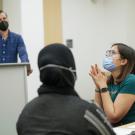A good letter of recommendation (L.O.R.) can truly set you apart from other applicants. Some schools do not accept them, but many, many do and they can also land you a private scholarship. Hopefully, you already have a teacher, community college professor or coach in mind.
Do: Find a Recommender Who Knows You
This letter is meant to show colleges and outside scholarship organizations (such as foundations, nonprofits and businesses) who you are and what kind of person you are. You need to find someone from whom you have taken multiple classes or have known for a while. They don’t need to know your deepest darkest secrets, but they should know why you are pursuing college or transferring to a four-year university, and what you are interested in.

Search for Outside Scholarships
UC Davis can help you get started on your scholarship search.
Don’t: Ask for a L.O.R. Just Because They Gave You a Good Grade
This relates to the above tip. It sounds like a good idea to ask the teacher who gave you the best grade for a L.O.R., but you need to think about it for a minute. Were you particularly verbal in class? Did you have discussions with your teacher? Would they be able to recognize you if you were wearing a wig?
A good grade does not equal a good recommendation. If you aced all the tests but did not interact much in class or were disruptive, reconsider.
Do: Ask Them During Lunch, Office Hours, or After Class
It is best to ask for a letter of recommendation in a more personal setting. By asking when they are free, you can tell them what you need the letter for and what your plans are. If you ask them during class or with others around, they may feel pressured and uncomfortable. In addition, if they deny your request, at least only the two of you will know, saving your ego.
Emailing them is a good option if you are feeling shy about asking; but generally speaking, it is better to ask them face to face. If it has been a semester or so since they last saw you, it can be helpful for them to see and interact with you before they write the L.O.R.
Here is an example of how you can ask a recommender if they are interested!
Hello (name), this is (your name). I hope you are doing well! I really enjoyed my time with you in (class/activity you had with them). Right now I am applying to (college or scholarship, mentioning general facts i.e. what is your intended major or why you are applying), and since you know me well, I was wondering if you could write me a letter of recommendation. I understand that you must be busy with classes and other things, but I would greatly appreciate this. If you are able to, the deadline is (date). Thank you so much for your time and consideration. I hope you are having a great week.
This can be adjusted for your own personal needs, and can be used to ask the recommender over email or in person. Remember to be kind, patient, and understanding.
Don’t: Ask Right Before the Time You Need it!
Ok, this is super important. If you ask them right before your deadline, they will either reject your request, not finish it on time or be forced to rush it and end up giving you a low-quality L.O.R. Ideally, you should ask your recommender for the letter about two months in advance. This is a long timeline that puts minimal pressure on them and allows them to focus on the L.O.R.
In some (but not all!) instances, a recommender may ask you to look over the L.O.R. before they finalize it. By asking further in advance, you have the possibility to double check the L.O.R. to see if they wrote your name correctly, which is super important. Even if they have known you for years, ensure that they have not used four different spellings of your name (I am speaking from experience).

Relating to College Professors
Read here to find the best tips and tricks for getting to know your professors.
Do: Check In With Them!
Obviously, you should avoid pestering them, but after about the one-month mark, start checking in every other week. This reminds them (excellent for well-meaning, but forgetful folks) and shows them that you are being active in your college application process. Be sure to thank them for the letter when you ask!
In some instances, your recommender will need to send the L.O.R. directly to the university or outside scholarship organizations. If this is the case, make sure that they understand what they need to do, and when they need to do it.
While not all schools in the UC system require a L.O.R. for UC scholarships or admission, many universities and scholarships do, so they are important to keep in your toolkit. A good L.O.R. can really push your application over the edge and make you a more competitive candidate. College and transfer application season can be frightening and confusing, but with the right tips and tricks, you can do it.
Abigail Loomis is a political science student and student editor of the UC Davis admissions blog. She is from Placerville, California and enjoys spending time with the Eggheads on campus.
